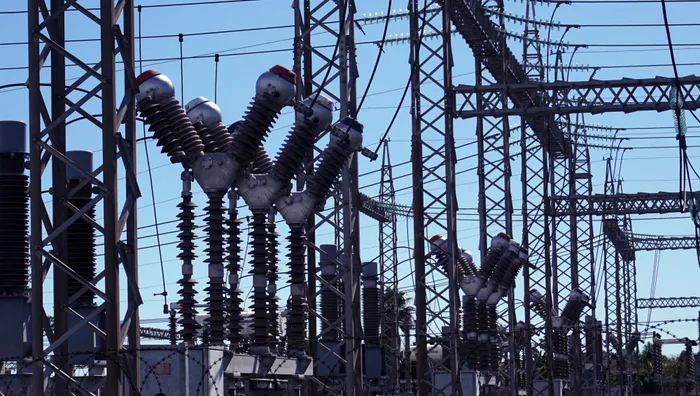Godongwana did well to address main concerns

Picture: Ian Landsberg/African News Agency (ANA) – An Eskom power sub-station near Welgelegen. Finance Minister Enoch Godongwana and his National Treasury team have had to take into consideration the priority areas of the economic and human landscape in drawing up the Budget for the country for the year ahead. They also had to take into consideration the huge economic challenges posed by Eskom loadshedding, considering that South Africa had 207 days of load shedding last year, says the writer.
By Bonke Dumisa
The Budget presentation by Minister of Finance Enoch Godongwana was a successful pragmatic balancing act, where he and his National Treasury team had to take into consideration the priority areas of the economic and human landscape.
To start with, they had to consider the global economic dynamics, considering the global inflationary pressures that forced them to revise South Africa’s economic growth rate predictions downwards.
They also had to take into consideration the huge economic challenges posed by Eskom load shedding, considering that South Africa had 207 days of load shedding last year, compared with only 75 days in 2021. In the fiscal year of 2022/23, our consolidated revenue was set at R1.89 trillion, with consolidated expenditure at R2.17 trillion, and a budget deficit of R276.1 billion.
The figures were their first challenge to pragmatically make budget estimates for the coming fiscal year of 2023/24. The small increases on the 2022/23 figures, with the revenues moving from R1.89 trillion to R1.96 trillion in 2023/24, expenditures moving from R2.17trillion to R2.24 trillion in 2023/24, and the budget deficit moving to R283.7 billion in 2023/24, showed that the national Budget was not for political claptrap purposes.
The major challenge with the base figures is that they assume that the revenue will increase in 2023/24, despite the fact that corporate income taxes in the past three fiscal years, since at least 2020, were boosted by significantly higher commodity prices.
With the Covid-19 pandemic out of the way and most of the Russian invasion of Ukraine having been factored in, there are fears that the commodity prices boom years are coming to an end, and prices have begun coming down. What negative effects will this have on tax revenue collections?
The negative multiplier effects of Eskom’s load shedding are also bound to put a significant dent in personal income taxes and corporate taxes. In short, as pragmatic as the tax collection figures are, there is a slight possibility that tax collections might be far lower than anticipated, and hence higher budget deficits than planned.
It was with this in mind that the 2023 Budget was based on a lower amount, of R1.6 trillion. It was based on this figure that the minister announced no major tax proposals, no increases to the fuel levy, no increases to the road levy, and some marginal change to the tax payment threshold from R91 250 to R95750 a year.
To fix the challenge posed by Eskom’s load shedding, the government pledged to make R254bn available to Eskom, out of the R400bn pledged at the September 2022 MediumTerm Budget Policy Statement (the mini budget).
The R254bn will be split into two tranches – R70bn and R184bn, with the promise to taxpayers being that Eskom will be made to properly account for every cent of the money in order to ensure that there is proper transparency that it has been used for its intended purpose of fixing the load-shedding problems.
To encourage businesses and individuals to invest in generating alternative renewable energy, the government has proposed some tax incentives for those who invest in solar panels. They promised an uncapped 125 percent tax rebate for businesses who invest in solar panels, and to allow a 25 percent tax deduction, up to a maximum of R15 000, for individuals.
This shows the government’s determination to counter the negative multiplier effect of load shedding. The government has finally publicly pronounced on the negative role played by the municipalities in financially disempowering Eskom. As of December last year, municipalities owed Eskom more than R56.3bn, “and the debt is rising”. The government pledged to do something about this, including helping the municipalities install prepaid meters in all the areas where there is a high level of non-payment and/or electricity theft.
It was reassuring to hear the minister of finance talking tough on the issue, saying that “the culture of non-payment must stop”. A total of R10.8bn was allocated to the provincial roads maintenance grant. Will we see all the dangerous potholes disappearing across the country? The government showed that it was actively listening to ordinary South Africans about the general lawlessness at our national borders.
It has invested R4.2bn in the establishment of a border management authority, and R3.1bn to enhance border security. The government has allocated R1.3bn to the National Prosecuting Authority to prosecute the cases arising from the state capture inquiry, an additional R265.3 million to the Financial Intelligence Centre to fight and tackle organised and financial crime, and an additional R100m to the Special Investigating Unit to initiate civil litigation aimed at reclaiming assets that are the proceeds of crime.
It was encouraging to see that the government was able to allocate some money towards improving the various social grants. I could not condense all 281 pages of the full Budget 2023 into fewer than two pages here. All I can say is that this was a pragmatic National Budget that sought to address most priority areas of the South African economic and human landscape.
Prof Bonke Dumisa is an independent economic analyst